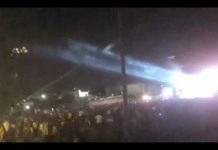The government has acknowledged that protection against missile attacks does not extend to all Israelis.
Officials said Israel’s missile defense umbrella remains uneven. They acknowledged that the upper middle class and wealthy Israelis enjoy far greater protection against missile attacks than the poor.
“A third of Israeli residents have no protection at all — no safe zones in their apartment, no bomb shelters in their buildings, and no functioning public shelters nearby,” Home Front Defense Minister Gilad Erdan said.
In an address to the Institute for National Security Studies on July 25, Erdan became the highest-level official to acknowledge a huge disparity in civil defense efforts in Israel. He contrasted those without any means of protection from missile and rocket attacks to those whose apartments were fortified against such a scenario. Since 1992, Israeli buildings have been required to include rooms designed to withstand a missile attack.
“Thirty percent have safe zones in their apartments,” Erdan said. “This is an intolerable gap.”
Over the last decade, the government has repeatedly delayed or reduced efforts to protect poor Israeli communities from missile and rocket attacks. Officials cited Finance Ministry opposition to legislation that would spend tens of millions of dollars to fortify apartment buildings near the Gaza Strip, which often came under daily attacks by Palestinian gunners.
Officials said the government has established a Cabinet committee to bolster civil defense both near the Gaza Strip and Lebanon. But they said Israel has not advanced since the war with Hizbullah in 2006, when 4,500 missiles rockets fell on the Jewish state.
“Who lacks protection: the weaker sections of society,” Erdan said.
“There is a governmental and moral obligation to deal with this gap.”
The address came amid warnings by the government and military of an Iranian-sponsored multi-front war against Israel. They said Israel could come under a daily barrage of more than 1,000 missile and rockets from such Iranian proxies as Hamas, Hizbullah and Syria.
“There’s a different [higher] level of accuracy in a growing number of projectiles, and there is no effective way to stop the development and arrival of these weapons,” Erdan said. “We have to take vital infrastructure into consideration. Otherwise, it will be difficult to maintain operational continuity in a future war.”










